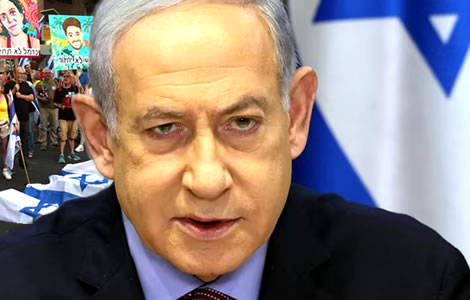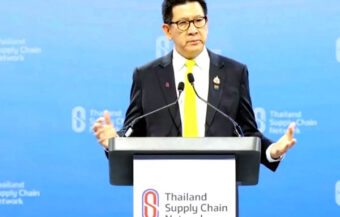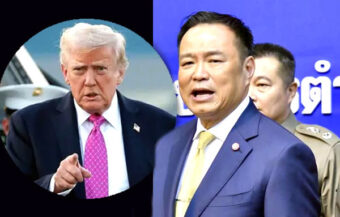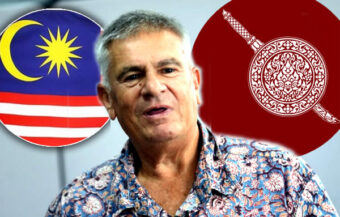Netanyahu doubles down on crushing Hamas, resisting any peace deal despite growing pressure and mass protests. The defiant PM insists a decisive military victory is the only way to end Hamas rule in Gaza.
Israeli veteran Prime Minister Benjamin Netanyahu is clinging to power and looks set to resist efforts to sign a deal with Hamas. In short, the hawkish prime minister insists that Israel must crush Hamas. So far, despite feigned efforts at negotiations, Netanyahu has resisted any prospect of a negotiated peace deal with the terrorist organisation. The defiant prime minister is determined that Hamas rule in Gaza is brought to an end. The only way to achieve this, he says, is a decisive military victory.

Benjamin Netanyahu, Israel’s long-serving prime minister, is doubling down on his Gaza strategy as he faces growing political turmoil, including mass protests and a general strike.
Despite mounting pressure to negotiate a deal with Hamas to secure the release of Israeli hostages, Netanyahu remains resolute, insisting that the war against the militant group will only end when Hamas no longer rules Gaza.
A Defiant Stance in the Face of Opposition
On Monday, Netanyahu held a defiant press conference in which he rejected calls to make concessions to Hamas. “When we have our boot on [Hamas’s] skull, that’s when they want us to make concessions?” he asked, reiterating his refusal to withdraw Israeli troops from the border between Gaza and Egypt—a key point of contention in the ongoing negotiations.
Netanyahu’s stance has drawn sharp criticism from various quarters, particularly from those who believe that a deal with Hamas could bring an end to the conflict and secure the release of the roughly 100 Israeli hostages still held in Gaza. Despite this, the prime minister has remained steadfast, arguing that any concessions would only embolden Hamas and prolong the conflict.
A Divided Nation: Strikes and Protests Reveal Israel’s deep fissures as the wartime Prime Minister soldiers on
The general strike, called by Israel’s powerful trade union federation, Histadrut, was intended to force Netanyahu’s hand, much like the strike last year that led him to delay his controversial judicial overhaul. However, this time around, the strike did not have the same impact. While liberal cities like Tel Aviv participated in the strike, more conservative areas, such as Jerusalem, largely abstained, exposing the deep divisions within Israeli society.
The strike’s effectiveness was further diminished when a court ruled that it must end early, citing concerns that it was being used for political purposes. This ruling highlighted the growing polarisation within the country, as different factions continue to pull in opposite directions.
Mass protests accompanied the strike, with hundreds of thousands of Israelis taking to the streets to demand a deal with Hamas. The protests were the largest public display of support for a hostage deal to date, but they were largely concentrated in liberal areas and failed to garner significant support from Netanyahu’s right-wing base.
Internal Divisions Threaten Netanyahu’s Coalition
While external pressure has so far failed to sway Netanyahu, internal divisions within his ruling coalition pose a more serious threat to his political survival. The coalition, made up of Netanyahu’s Likud party, two ultra-religious parties, and two extreme-right parties, has been increasingly fractious in recent months.
Disagreements have arisen over a range of issues. These range from the conscription of ultra-Orthodox men to the rules governing Jerusalem’s sensitive holy sites. However, the most intense disputes have centred around the war with Hamas. In brief, this was triggered by the militant group’s devastating attack on Israel on October 7.
Israel’s military and security chiefs, along with Defense Minister Yoav Gallant, have been advocating for a deal. They suggest that negotiating with Hamas as the best way to secure the hostages’ release.
However, the two ultranationalist parties in Netanyahu’s coalition—led by Finance Minister Bezalel Smotrich and National Security Minister Itamar Ben-Gvir—remain firmly opposed. In short, they reject any deal that does not result in Hamas’s complete destruction. They have threatened to pull out of the coalition and force early elections. That is if Netanyahu yields to pressure for a deal.
The High Stakes of a Hostage Deal
The tension within Netanyahu’s coalition came to a head in recent days. It happened after the recovery of the bodies of six hostages held by Hamas on Sunday. Gallant demanded that the government reconsider its position. In particular on keeping troops at the Gaza-Egypt border. Certainly, this has been a major sticking point in negotiations. In response, Smotrich accused Gallant of seeking a “surrender deal,” further inflaming tensions within the government.
Hopes that 25 Thai hostages held by Hamas in Gaza may be freed in the next 10 days in ceasefire
Top Shia Muslim leader condemns Thai nationals fighting with Israel’s Army as a stab in the back
Political analysts suggest that Netanyahu is in a far more precarious position than he was last year when he delayed the judicial overhaul. This time, conceding to demands for a hostage deal could trigger the collapse of his coalition. After that, there would be forced early elections. This is a scenario that polls indicate Netanyahu and his allies would likely lose.
Netanyahu’s Calculations and Future Prospects
Despite the internal and external pressures, Netanyahu remains focused on maintaining his coalition and pursuing his military strategy.
Political strategist Nadav Strauchler has previously worked with Netanyahu. He argues that the prime minister will not agree to a hostage deal that risks his coalition’s survival. However, Strauchler also notes that the coalition appears on the brink of collapse. Netanyahu might seek an “achievement” to present to the public. For instance, a hostage deal or a military success in the ongoing conflict with Hezbollah on Israel’s northern border.
As the situation continues to evolve, Netanyahu’s options are becoming increasingly limited. With the Israeli parliament set to reconvene in late October, and the U.S. presidential election looming in November, the political landscape is likely to become even more complex.
All eyes now on Netanyahu’s Gamble
Analysts believe that Netanyahu will seek to achieve something significant before these key dates, whether it be a military victory or a political breakthrough.
For now, Netanyahu appears determined to stay the course, despite the growing opposition.
Ending the conflict without achieving the “ultimate victory” he has promised would leave him vulnerable to a political reckoning over the failures of October 7. Aviv Bushinsky is a former chief of staff to Netanyahu. He notes: “Under these circumstances, Netanyahu—who defines himself as Mr. Security—cannot afford to back down.”
Join the Thai News forum, follow Thai Examiner on Facebook here
Receive all our stories as they come out on Telegram here
Follow Thai Examiner here
Further reading:
Top Shia Muslim leader condemns Thai nationals fighting with Israel’s Army as a stab in the back
Thai hostages held by Hamas used to leverage influence over Israel as it prepares to invade Gaza
Israel to pay ฿35k per month to wives of Thai workers killed in Hamas raid and child support
Rogue Israeli tourist is taken into custody by Immigration Bureau police prior to deportation
On the run Israeli tourist tracked down to Ko Samui, surrenders to authorities, taken to hospital
Thailand votes on the right side of history in UN deploring Russian military action in Ukraine


















